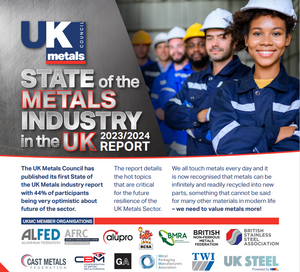Rising energy prices, the impact of life after the EU and labour shortages continue to be the main challenges facing the UK metals sector according to a new report.
Nearly a quarter of firms in the UK Metals Council’s State of the Metals Industry in the UK 2023/24 survey admitted to adjusting supply chain strategies or sourcing alternatives, whilst just under a third want enhanced Government support to navigate trade barriers and custom procedures in the wake of Brexit.
22% of manufacturers are also looking for improved energy supply contracts to bring prices down to more affordable levels, with just 31% of businesses saying that they have an effective recruitment strategy in place for filling the well-documented labour gaps.
Despite the widespread challenges, 70% of respondents are optimistic or very optimistic about future business prospects, underlining the resilience of the sector and its ability to innovate.
“We touch metals every day, whether that is in our homes, in the cars, planes and trains we travel in, the medical devices we rely on, as well as tools and machinery used for their production,” explained Rachel Eade MBE, Chair of the UK Metals Council.
“Importantly, it is now recognised that metals can be infinitely and readily recycled into new parts, something that cannot be said for many other materials in modern life – we need to value metals more as we move to a Net Zero economy.
“Foundation industries will continue to play a critical role in the way we all live, and this vital sector needs a voice to ensure that the Government understands the journey we are on.”
She went on to add: “This is why we came up with the State of the Metals Industry in the UK Report, in conjunction with the team from the UK Metals Expo. It’s a unique opportunity for us to canvas the views of primes, metal producers and those in the downward supply chain.
“The issues the industry is facing span from supply chain disruption because of Brexit to availability of raw materials and how they can mitigate the cost of energy – a key issue when you consider levels of consumption in our industry.
“Skills and the ability to get new people into our sector is also a challenge that is holding many of them back as they look to support the UK’s desire to move towards Net Zero. We’ll also be highlighting this to Government at the UK Metals Expo.”
The UK Metals Council is made up of 12 trade associations from across the full spectrum of the metals supply chain, from primary manufacturing to recycling.
In total, it represents the interests and views of over 11,000 companies, employing directly and indirectly nearly one million people.
Some BMRA members will have contributed to the survey that informed the report.
Download the report here.

